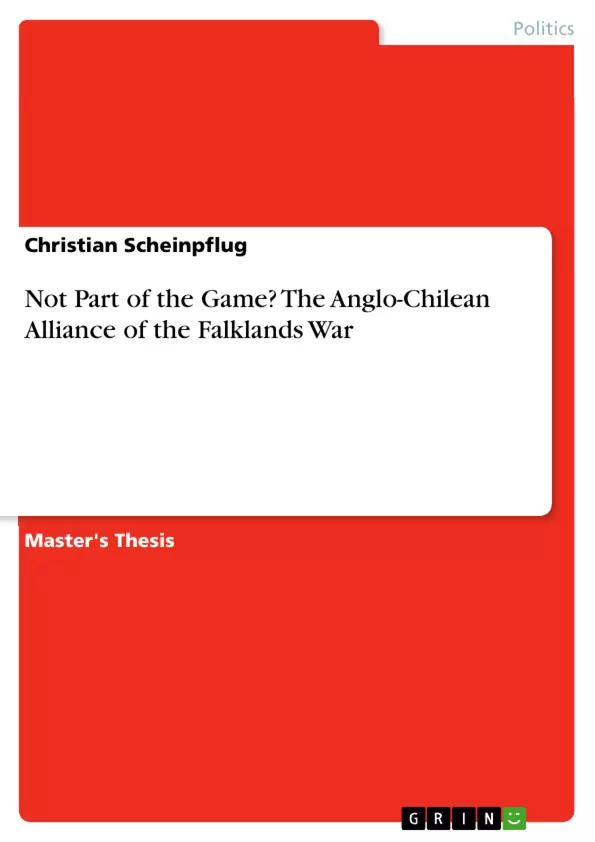One spectrum of the orthodox narrative of the Malvinas campaign in 1982 implies that Argentina’s loss originated with its megalomaniac leadership. Their supposedly erratic moves cost the country 649 lives and caused national humiliation, but also initiated the process that terminated dictatorship. The other spectrum recognises a decisive, if hard-won, military success that turned into Margaret Thatcher’s landslide re-election victory. This orthodox narrative, however, blurs a thorough analysis of the war, because it misinterprets its causes.
This study moves the analysis into uncharted waters by investigating the alliance between Britain and Chile during the war. Chile’s effort was significant insofar as it helped to keep British losses down and provided intelligence that eventually led to the decision to sink the Belgrano. Britain, as part of the deal, transferred arms to Chile and helped to brush up the Pinochet dictatorship’s image abroad; thus sustaining it through its most precarious period, the severe economic crisis of 1982.
Theoretical input by offensive realism and neo-Marxism provides the overall frame. Both are structural theories with particular focus on soil and territory. Chapter 2 distils prevalent aspects of both approaches and defends their use over agency-based theories like social constructivism and interpretivism. Chapter three is the entry point to Southern Cone geopolitics as it analyses the defining events of Chilean-Argentine relations: the Pacific War of 1879-1883 and the Beagle Crisis in 1978. After Chapter four will have put these events in perspective the unorthodox conclusion emerges, arguing that the Falklands War was not an attack on British sovereignty per se but a move against Chile to obtain hegemony in the South Atlantic.
Inhaltsverzeichnis (Table of Contents)
- Abstract
- Introduction
- Chapter 1: Study Background
- 1.1 Terms and Methods
- Limitations
- 1.2 Literature Review
- Chapter 2: Theoretical Considerations
- 2.1 Materialist and Idealist Theory
- 2.2 Idealist Theories
- 2.3 Offensive Realism
- 2.4 Neo-Marxist Theory
- Summary
- Chapter 3: Key Events
- 3.1 The Pacific War
- 3.2 The Beagle Crisis
- Chapter 4: The Alliance in Perspective
Zielsetzung und Themenschwerpunkte (Objectives and Key Themes)
This study examines the Anglo-Chilean alliance during the Falklands War of 1982, challenging the orthodox narrative that focuses solely on Argentina's leadership and Britain's victory. By investigating the alliance, the study aims to provide a deeper understanding of the war's origins and complexities.
- The role of Chile in supporting British military action against Argentina
- The strategic motivations of Argentina's decision to invade the Falklands
- The historical context of Chilean-Argentine relations, including the Pacific War and the Beagle Crisis
- The application of offensive realism and neo-Marxist theory to explain the alliance and the war
- The impact of the Falklands War on British and Chilean society, as well as the downfall of the Argentine military junta
Zusammenfassung der Kapitel (Chapter Summaries)
- Abstract: The study challenges the conventional view of the Falklands War, arguing that it was not simply a conflict between Britain and Argentina but also involved a strategic alliance between Britain and Chile.
- Introduction: The introduction provides historical context and outlines the research questions guiding the study. It emphasizes the significance of the Anglo-Chilean alliance in shaping the course of the war.
- Chapter 1: Study Background: This chapter establishes the terms and methods used in the study, discusses the limitations, and reviews relevant literature.
- Chapter 2: Theoretical Considerations: This chapter explores the theoretical frameworks of offensive realism and neo-Marxist theory, arguing for their relevance in analyzing the Anglo-Chilean alliance and the Falklands War.
- Chapter 3: Key Events: This chapter examines key events in Chilean-Argentine relations, focusing on the Pacific War of 1879-1883 and the Beagle Crisis of 1978, highlighting the historical tensions and strategic considerations that shaped the alliance.
Schlüsselwörter (Keywords)
The main keywords and focus topics of the text include the Anglo-Chilean alliance, Falklands War, offensive realism, neo-Marxist theory, Pacific War, Beagle Crisis, Southern Cone geopolitics, Chilean-Argentine relations, strategic motivations, and the impact of the war on British, Chilean, and Argentine society.
- Citation du texte
- Christian Scheinpflug (Auteur), 2015, Not Part of the Game? The Anglo-Chilean Alliance of the Falklands War, Munich, GRIN Verlag, https://www.grin.com/document/311655



